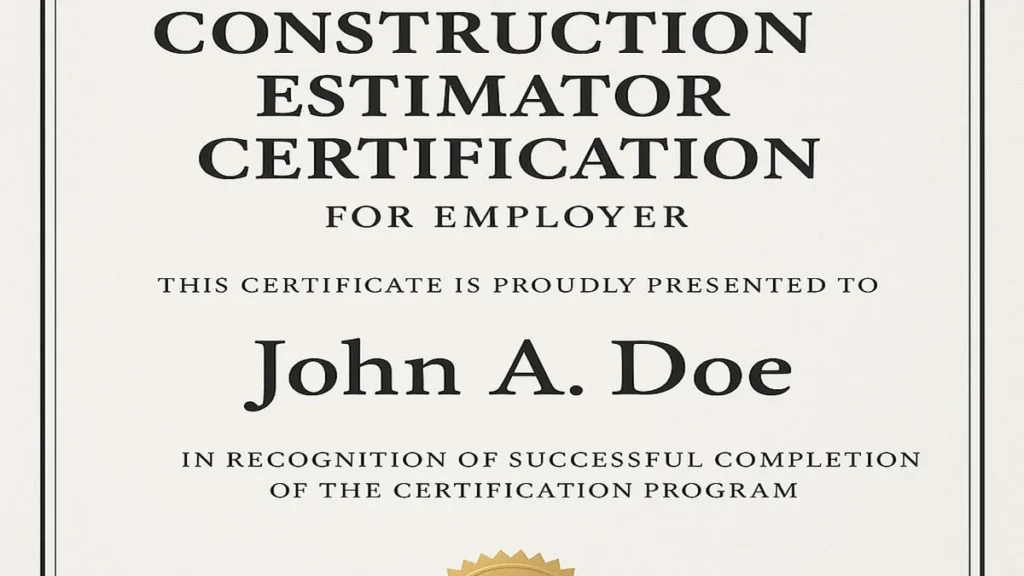Construction Estimator Certifications


Getting Construction Estimator Certifications is one of the smartest steps for anyone who wants to grow in the construction field. Employers and clients depend on accurate estimates to control costs, avoid delays, and keep projects on track. A certified estimator shows that they have the training, the tools, and the judgment to deliver reliable numbers. That proof builds trust and helps teams to prevent costly mistakes during improving overall efficiency on every job.
Certifications also boost confidence for both clients and employers. When a professional has official training and recognition, it signals that their work meets clear industry standards. That trust can lead to the bigger projects, stronger client relationships, and steadier work. For anyone serious about moving up in their career, earning a certification is a choice that pays off over time and shows real commitment to quality.
Why Construction Estimator Certifications Matter
Construction runs on precise information. Small mistakes in cost can become big financial problems later. Construction Estimator Certifications give owners and contractors assurance that the estimator knows how to avoid those risks. A certified professional understands materials, labor, equipment, scheduling, and codes, and can turn that knowledge into a clear strategy that fits the budget and supports the schedule.
In a competitive market, certifications are more than a badge. They are a real advantage. Employers want people who show steady learning and high standards. Clients prefer certified estimators because it lowers the risk of missing costs or forgetting key items. By certification, an estimator proves they can meet deadlines, handle complex scopes, and offer honest, transparent pricing. That credibility often leads to repeat work, better referrals, and long term partnerships.
Another reason these credentials matter is teamwork. Estimators work with project managers, superintendents, suppliers, and accountants. A certified estimator knows how to speak the same language as each group. They can explain the reason behind each number and help the team make smart choices about methods, materials, and timing. This kind of clear, simple communication reduces confusion and keeps everyone focused on the plan.
Pathways to Becoming a Certified Estimator
There is more than one way to earn Construction Estimator Certifications. Many colleges and technical schools provide programs that mix classroom lessons with practical exercises. You may study blueprint reading, quantity takeoff, project controls, contracts, and construction technology. Online courses make it easier to balance training with a full time job, and many include practice projects you can add to your portfolio.
Some certifications require industry experience, while others welcome newcomers who want to start a career. Advanced credentials may require a tough exam, proof of completed work, or letters of recommendation. Many programs also expect continuing education. This keeps you up to date on new products, delivery methods, green building standards, and modern estimating software. By choosing a pathway that matches your goals and learning style, you can build skills step by step and move forward with confidence.
Benefits of Becoming Certified
Being certified gives you the benefits that go far beyond a line on your resume. It brings recognition, credibility, and real career growth.
- Stronger credibility with employers, contractors, and clients
- Better chances for promotions and leadership roles
- More stability even when the market changes
- Higher earning potential over time
- Recognition across the wider construction industry
- Access to helpful networks and professional groups
- Confidence when pricing complex scopes
- Ongoing learning that keeps skills current
- Clearer communication with owners and design teams
- Better risk control and fewer cost surprises
Each of these advantages supports long term success. For many professionals, certification is not only about job. It is about building a reputation that lasts and a skill set that can travel with you from one region to another and from one project type to the next.
Skills You Gain Through Certification
Construction Estimator Certifications build both technical and people skills. On the technical side, you learn detailed quantity takeoff, cost analysis, and risk planning. You practice using industry software for drawings, takeoffs, pricing, and reports, that speeds up your work and raises accuracy. You also study scheduling basics so your numbers line up with the timeline and support smart sequencing.
You also learn how to write clear scopes of work and how to review bids from subcontractors. You learn to compare apples to apples and spot gaps in coverage. This protects the budget and makes awards fair and transparent.
On the people side, certification training helps with communication and problem solving. Estimators often explain costs to clients who are not experts. Clear, simple language builds trust and reduces conflict. Many programs also cover ethics and standards, so decisions are both profitable and responsible. This mix of hard and soft skills helps you work well with designers, contractors, suppliers, and owners.
Top Certification Programs to Explore
Not all programs are the same, so it pays to choose carefully. Well regarded options often come from national associations and accredited schools. These programs blend real examples with solid theory, so that you learn how to apply methods on live projects. Many offer flexible schedules for people who work full time, and some offer recorded lessons so you can study at your own pace.
High quality programs may include topics like sustainable methods, advanced delivery systems, cost modeling, value analysis, and digital estimating tools. Some add mentoring, career fairs, mock interviews, and guest talks from industry leaders. Look for clear accreditation, a current curriculum, up to date software training, and strong links to employers. That way your credential has value in more than one market and helps you stand out when roles are competitive.
Read more: Estimating Cost to Build a Bowling Alley.
Career Opportunities After the Certification
Certification can open doors. Certified estimators are frequently preferred for roles at major contractors, specialty trades, engineering firms, and public agencies where the accuracy matters. With experience, many move into the senior estimator, preconstruction manager, project manager, or cost consultant roles. These positions bring higher pay and a bigger voice in key decisions about design, schedule, and buyout.
Public work and large private jobs often require proof of qualifications. A recognized credential can meet that requirement and make your proposal stronger. In addition, many owners now ask for clear cost plans at early design stages. A certified estimator can provide that service and guide the team as the drawings grow from concept to final set. This helps control cost drift and keeps the project within the target budget.

